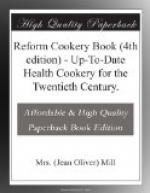“I for my part can affirm that those whom I have known to submit to this (the vegetarian) regimen have found its results to be restored or improved health, marked addition of strength, and the acquisition by the mind of a clearness, brightness, well-being, such as might follow the release from some secular, loathsome detestable dungeon.... All our justice, morality, and all our thoughts and feelings, derive from three or four primordial necessities, whereof the principal one is food. The least modification of one of these necessities would entail a marked change in our moral existence. Were the belief one day to become general that man could dispense with animal food, there would ensue not only a great economic revolution—for a bullock, to produce one pound of meat, consumes more than a hundred of provender—but a moral improvement as well.”—Maurice Maeterlinck.
“Can anything be so elegant as to have few wants, and to serve them one’s self, so to have somewhat left to give, instead of being always prompt to grab.”—Emerson.
Foreword.
“Diet cures mair than physic.”—Scotch Proverb.
“The first wealth is health.”—Emerson.
“Of making books there is no end,” and as this is no less true of cookery books than of those devoted to each and every other subject of human interest, one rather hesitates to add anything to the sum of domestic literature. But while every department of the culinary art has been elaborated ad nauseam, there is still considerable ignorance regarding some of the most elementary principles which underlie the food question, the relative values of food-stuffs, and the best methods of adapting these to the many and varied needs of the human frame. This is peculiarly evident in regard to a non-flesh diet. Of course one must not forget that there are not a few, even in this age, to whom the bare idea of contriving the daily dinner, without the aid of the time-honoured flesh-pots, would seem scarcely less impious than absurd, as if it threatened the very foundations of law and order. Still there is a large and ever increasing number whose watch word is progress and reform, who would be only too glad to be independent of the abattoir (I will not offend gentle ears with the coarse word slaughter-house), if they only knew how. In summertime, at least, when animal food petrifies so rapidly, many worried housekeepers, who have no prejudice against flesh-foods in general, would gladly welcome some acceptable substitute. The problem is how to achieve this, and it is with the view of helping to that solution that this book is written.
Now, as I said, while there is no lack of the stereotyped order of domestic literature, there seems to be a wide field over which to spread the knowledge of “Reform” dietary, and how to adapt it to the needs of different people, and varying conditions. And while protesting against all undue elaboration—for all true reform should simplify life rather than complicate it—we should do well to acquire the knowledge of how to prepare a repast to satisfy, if need be, the most exacting and fastidious.




